Related Research Articles

Julius Henry "Groucho" Marx was an American comedian, actor, writer, and singer who performed in film and vaudeville and on television, radio, and the stage. He was a master of quick wit and is considered one of America's greatest comedians.
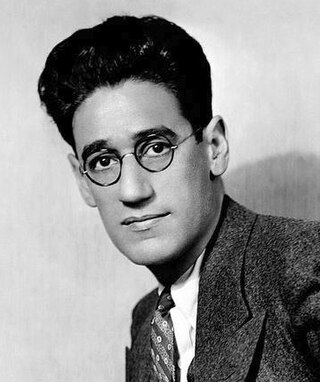
George Simon Kaufman was an American playwright, theater director and producer, humorist, and drama critic. In addition to comedies and political satire, he wrote several musicals for the Marx Brothers and others. He won the Pulitzer Prize for Drama for the musical Of Thee I Sing in 1932, and won again in 1937 for the play You Can't Take It with You. He also won the Tony Award for Best Director in 1951 for the musical Guys and Dolls.

The Marx Brothers were an American family comedy act that was successful in vaudeville, on Broadway, and in 14 motion pictures from 1905 to 1949. Five of the Marx Brothers' fourteen feature films were selected by the American Film Institute (AFI) as among the top 100 comedy films, with two of them, Duck Soup (1933) and A Night at the Opera (1935), in the top fifteen. They are widely considered by critics, scholars and fans to be among the greatest and most influential comedians of the 20th century. The brothers were included in AFI's 100 Years... 100 Stars list of the 25 greatest male stars of Classical Hollywood cinema, the only performers to be included collectively.

Duck Soup is a 1933 American pre-Code musical black comedy film written by Bert Kalmar and Harry Ruby and directed by Leo McCarey. Released by Paramount Pictures on November 17, 1933, it stars the four Marx Brothers and also features Margaret Dumont, Louis Calhern, Raquel Torres and Edgar Kennedy. Duck Soup was the last of the five Marx Brothers films released by Paramount Pictures. In the film, Groucho portrays the newly installed president of the fictional country of Freedonia. Zeppo is his secretary, while Chico and Harpo are spies for the neighboring country of Sylvania. Relations between Groucho and the Sylvanian ambassador deteriorate during the film, eventually leading the two countries to war.

A Night at the Opera is a 1935 American comedy film starring the Marx Brothers, and featuring Kitty Carlisle, Allan Jones, Margaret Dumont, Sig Ruman, and Walter Woolf King. It was the first of five films the Marx Brothers made under contract for Metro-Goldwyn-Mayer after their departure from Paramount Pictures, and the first after Zeppo left the act. The film was written by George S. Kaufman and Morrie Ryskind from a story by James Kevin McGuinness, with additional uncredited dialogue by Al Boasberg. The film was directed by Sam Wood. One of MGM's biggest hits at the 1935 box office, A Night at the Opera was selected in 1993 for preservation in the National Film Registry by the Library of Congress as being "culturally, historically, or aesthetically significant". It is also included in the 2007 update of AFI's 100 Years... 100 Movies, at number 85; and previously in AFI's 100 Years...100 Laughs 2000 showing, at number 12.

Arthur "Harpo" Marx was an American comedian, actor, mime artist, and harpist, and the second-oldest of the Marx Brothers. In contrast to the mainly verbal comedy of his brothers Groucho and Chico, Harpo's comic style was visual, being an example of vaudeville, clown and pantomime traditions. He wore a curly reddish blond wig and was silent in all his movie appearances, instead blowing a horn or whistling to communicate. Marx frequently employed props such as a horn cane constructed from a lead pipe, tape, and a bulbhorn.

Leonard Joseph "Chico" Marx was an American comedian, actor and pianist. He was the oldest brother in the Marx Brothers comedy troupe, alongside his brothers Arthur ("Harpo"), Julius ("Groucho"), Milton ("Gummo") and Herbert ("Zeppo"). His persona in the act was that of a charming, uneducated but crafty con artist, seemingly of rural Italian origin, who wore shabby clothes and sported a curly-haired wig and Tyrolean hat. On screen, Chico is often in alliance with Harpo, usually as partners in crime, and is also frequently seen trying to con or outfox Groucho. Leonard was the oldest of the Marx Brothers to live past early childhood, the first-born being Manfred Marx who had died in infancy. In addition to his work as a performer, he played an important role in the management and development of the act in its early years.
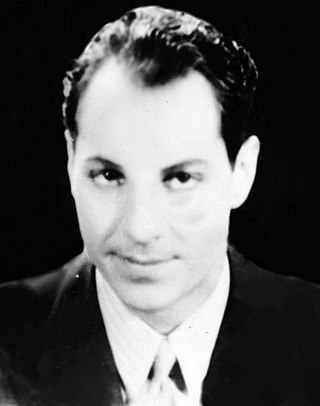
Herbert Manfred "Zeppo" Marx was an American comedic actor. He was the youngest and last survivor of the five Marx Brothers. He appeared in the first five Marx Brothers feature films from 1929 to 1933, and then left the act for careers as an engineer and theatrical agent.
Harry Rubenstein, known professionally as Harry Ruby, was an American pianist, composer, songwriter and screenwriter, who was inducted into the Songwriters Hall of Fame in 1970. He was married to silent film actress Eileen Percy.

Richard Alva Cavett is an American television personality and former talk show host. He appeared regularly on nationally broadcast television in the United States from the 1960s through the 2000s.

The Dick Cavett Show is the title of several talk shows hosted by Dick Cavett on various television networks, including:
Erin Leslie Fleming was a Canadian actress, best known as the companion and manager of comedian Groucho Marx during his final years.
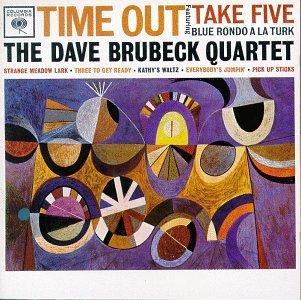
Time Out is a studio album by the American jazz group the Dave Brubeck Quartet, released in 1959 on Columbia Records. Recorded at Columbia's 30th Street Studio in New York City, it is based upon the use of time signatures that were unusual for jazz such as 9
8, 6
4 and 5
4. The album is a subtle blend of cool and West Coast jazz.
Flywheel, Shyster, and Flywheel is a situation comedy radio show starring two of the Marx Brothers, Groucho and Chico, and written primarily by Nat Perrin and Arthur Sheekman. The series was originally broadcast in the United States on the National Broadcasting Company's Blue Network, beginning on November 28, 1932, and ending on May 22, 1933. Sponsored by the Standard Oil Companies of New Jersey, Pennsylvania and Louisiana and the Colonial Beacon Oil Company, it was the Monday night installment of the Five-Star Theater, an old-time radio variety series that offered a different program each weeknight. Episodes were broadcast live from NBC's WJZ station in New York City and later from a sound stage at RKO Pictures in Los Angeles, California, before returning to WJZ for the final episodes.
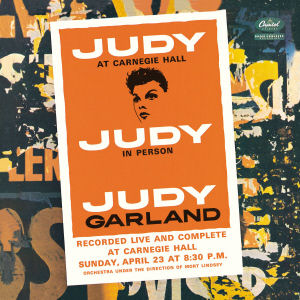
Judy at Carnegie Hall is a double-LP live recording of a concert by Judy Garland at Carnegie Hall in New York, with backing orchestra led by Mort Lindsey. This concert appearance, on the night of Sunday April 23, 1961, has been called "the greatest night in show business history".
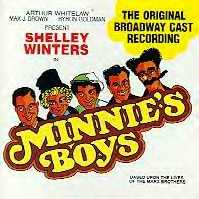
Minnie's Boys is a musical with a book by Arthur Marx and Robert Fisher, music by Larry Grossman, and lyrics by Hal Hackady.
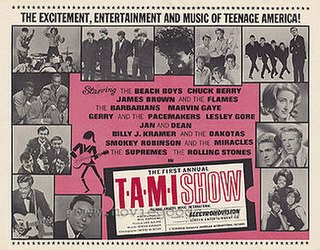
T.A.M.I. Show is a 1964 concert film released by American International Pictures. It includes performances by numerous popular rock and roll and R&B musicians from the United States and England. The concert was held at the Santa Monica Civic Auditorium on October 28 and 29, 1964. Free tickets were distributed to local high school students. The acronym "T.A.M.I." was used inconsistently in the show's publicity to mean both "Teenage Awards Music International" and "Teen Age Music International".
Flywheel, Shyster, and Flywheel is a BBC Radio 4 1990 situation comedy radio show, adapted from a 1932 American radio show of the same name. The original series starred two of the Marx Brothers, Groucho and Chico, and was written primarily by Nat Perrin and Arthur Sheekman. It depicted the misadventures of a small law firm, with Groucho acting as attorney Waldorf T. Flywheel, and Chico playing Flywheel's assistant Emmanuel Ravelli. In 1988 the show scripts were rediscovered in the US Library of Congress, and were adapted by the BBC two years later. The lead roles are performed by professional Marx Brothers soundalikes: Michael Roberts as Groucho's Flywheel and Frank Lazarus as Chico's Ravelli. Other cast members include Lorelei King playing all the female roles, Graham Hoadly as the Announcer and roles in every episode, Vincent Marzello, Spike Milligan and Dick Vosburgh guest starring. During the recording sessions, on occasions Michael Roberts would adlib certain comments and these were left in the final recordings.
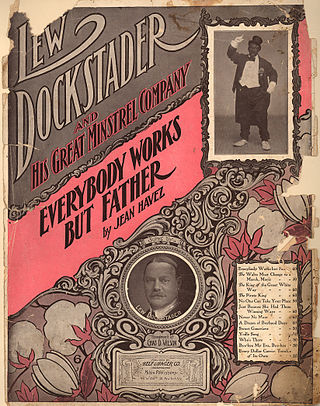
"Everybody Works but Father" is a popular song published in 1905, with words and music by Jean Havez. It is sung from the point of view of the son, lamenting that he, his sister and his mother all work, while his father lounges all day: "Everybody works at our house but my old man." The song was introduced and recorded by blackface performer Lew Dockstader.
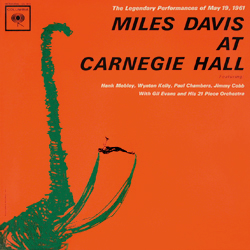
Miles Davis at Carnegie Hall: The Legendary Performances of May 19, 1961 is a live album by American jazz musician Miles Davis originally released by Columbia in 1962.
References
- ↑ "Talent". Billboard . 16 December 1972. p. 18. Retrieved 7 May 2012.
- ↑ "When Dick Cavett Shared Carnegie Hall With Groucho". NPR . 6 May 2012. Retrieved 7 May 2012.
- ↑ "National Recording Registry Reaches 500". Library of Congress. March 21, 2018. Retrieved March 21, 2018.